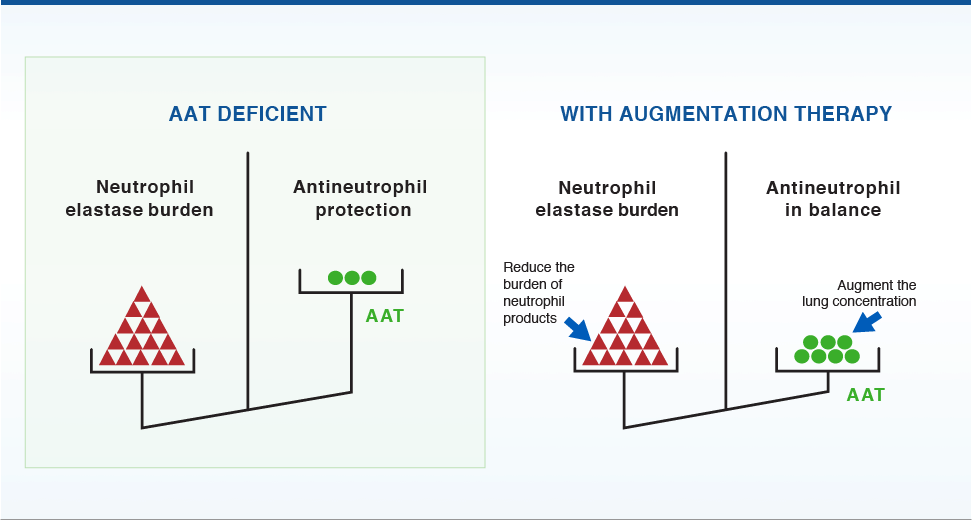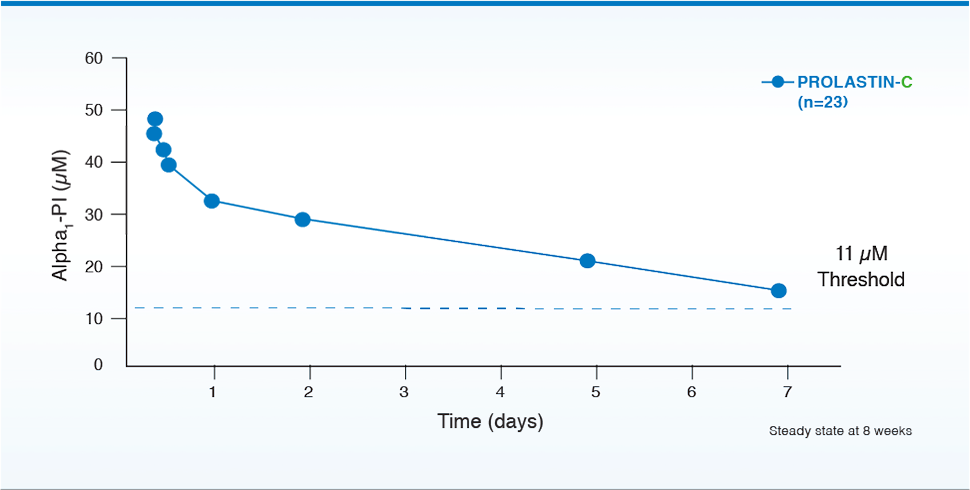Why augmentation therapy?
Treatment of alpha-1

Augmentation therapy is proven to effectively raise alpha1-antitrypsin (AAT) levels in patients with alpha-1 and help keep neutrophil elastase in check.1
- Augmentation therapy is the only treatment specifically approved for adults with emphysema due to severe deficiency of alpha-1 protein2
- The intended theoretical goal is to correct the imbalance between neutrophil elastase and AAT2
How PROLASTIN-C LIQUID helps your patients with alpha-1
Mean plasma AAT concentration vs time following treatment with PROLASTIN-C1

- PROLASTIN-C LIQUID therapy raises AAT levels and antineutrophil elastase activity in the lungs. Although the maintenance of blood serum levels of alpha1-proteinase inhibitor above 11 μM has been historically postulated to provide therapeutically relevant antineutrophil elastase protection, this has not been proven.2
A safety profile trusted for more than 25 years
- The most common adverse reactions during PROLASTIN-C LIQUID clinical trials in >5% of subjects were diarrhea and fatigue, each of which occurred in 2 subjects (6%)2
See how PROLASTIN-C LIQUID works to help your patients with alpha-1
Still have questions?
Treating your patients with alpha-1 with PROLASTIN-C LIQUID
- For all of your patients with COPD, it's important to incorporate alpha-1 testing into your practice protocol
- In the case of a positive diagnosis, severe alpha-1 clinical evidence of emphysema, you should start your patients on an augmentation therapy like PROLASTIN-C LIQUID. It's also important that family members be tested
- Once diagnosed, enrolling your patients in the PROLASTIN DIRECT® program will provide them with comprehensive, personalized alpha-1 support
When it comes to choosing a replacement therapy for my patients, I use PROLASTIN-C LIQUID exclusively…. This is the therapy that has the most infusions internationally. This is the company and the product that has a very, very special program with dedicated experts, PROLASTIN DIRECT.
Enroll your patients in the PROLASTIN DIRECT® program
PROLASTIN-C LIQUID is available only through the PROLASTIN DIRECT program.

IMPORTANT SAFETY INFORMATION
PROLASTIN®-C LIQUID is an alpha1-proteinase inhibitor (human) (alpha1-PI) indicated for chronic augmentation and maintenance therapy in adults with clinical evidence of emphysema due to severe hereditary deficiency of alpha1-PI (alpha1-antitrypsin deficiency).
Limitations of Use
- The effect of augmentation therapy with any alpha1-PI, including PROLASTIN-C LIQUID, on pulmonary exacerbations and on the progression of emphysema in alpha1-PI deficiency has not been conclusively demonstrated in randomized, controlled clinical trials
- Clinical data demonstrating the long-term effects of chronic augmentation or maintenance therapy with PROLASTIN-C LIQUID are not available
- PROLASTIN-C LIQUID is not indicated as therapy for lung disease in patients in whom severe alpha1-PI deficiency has not been established
PROLASTIN-C LIQUID is contraindicated in immunoglobulin A (IgA)-deficient patients with antibodies against IgA or patients with a history of anaphylaxis or other severe systemic reaction to alpha1-PI products.
Hypersensitivity reactions, including anaphylaxis, may occur. Monitor vital signs and observe the patient carefully throughout the infusion. If hypersensitivity symptoms occur, promptly stop PROLASTIN-C LIQUID infusion and begin appropriate therapy.
Because PROLASTIN-C LIQUID is made from human plasma, it may carry a risk of transmitting infectious agents, eg, viruses, the variant Creutzfeldt-Jakob disease (vCJD) agent, and, theoretically, the Creutzfeldt-Jakob disease (CJD) agent. This also applies to unknown or emerging viruses and other pathogens.
The most common adverse reactions during PROLASTIN-C LIQUID clinical trials in >5% of subjects were diarrhea and fatigue, each of which occurred in 2 subjects (6%).
Please see full Prescribing Information for PROLASTIN-C LIQUID.
You are encouraged to report negative side effects of prescription drugs to the FDA. Visit www.fda.gov/medwatch or call 1-800-FDA-1088.
Reference:
1. Data on file, Grifols. 2. PROLASTIN®-C LIQUID (alpha1-proteinase inhibitor [human]) Prescribing Information. Grifols.


